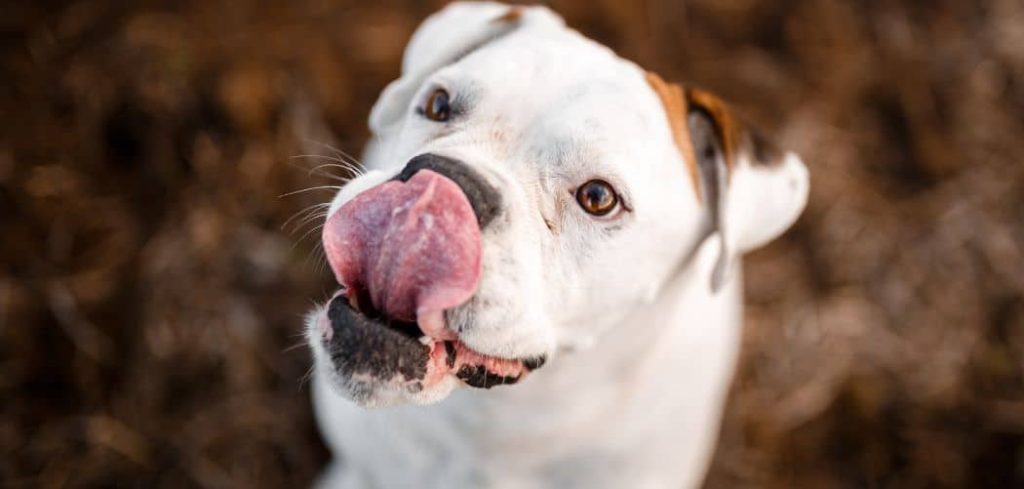When your dog refuses everything except chicken, it can be worrying and frustrating. While chicken is a healthy protein, dogs need a balanced diet to stay healthy, and an all-chicken diet can lead to nutritional deficiencies over time.
We outline the common reasons for dogs only wanting to eat chicken, what you can do, and when to seek veterinary help.
Dog Only Eats Chicken — Why It Happens
A dog that only eats chicken is usually being selective due to taste preference, habit, or an underlying health issue. Some dogs develop picky eating habits after being offered table scraps or home-cooked meals, while others may reject kibble if it causes stomach upset. Illnesses, dental pain, or even anxiety can also make chicken the only appealing option.
While chicken itself isn’t harmful, a diet limited to one protein source is not complete and can put your dog’s health at risk.

Dog Only Eats Chicken: Common Causes
Picky Eating Habits
Dogs can quickly learn that if they refuse their regular food, owners may offer something tastier like chicken. Over time, this reinforces picky eating.
Chicken is flavorful and soft, making it much more appealing than dry kibble, so many dogs begin rejecting everything else.
While this may seem harmless, long-term selective eating prevents dogs from getting the balance of nutrients they need.
Read more: Dog Only Eats Treats (Why it happens and how to fix it)
Food Intolerance or Digestive Sensitivity
If your dog experiences stomach upset from certain foods, they may instinctively avoid them and prefer something that feels safer, like plain chicken.
Dogs with sensitive stomachs may vomit, have loose stools, or develop gas after eating certain brands of food.
This makes chicken their default “safe food.” While chicken is gentle on digestion, relying only on it can mask the underlying dietary issue.
Dental Pain or Oral Discomfort
Dogs with bad teeth, gum disease, or mouth pain may reject harder foods like kibble and gravitate toward softer options such as cooked chicken.
Since chicken is tender and easy to chew, it can feel more comfortable to eat. If your dog only eats chicken and avoids crunchier foods, dental issues may be the hidden cause. Left untreated, dental disease can worsen and lead to infections and weight loss.
Learned Association
Some dogs are fed chicken during illness or recovery because it’s bland and gentle on the stomach.
Once they recover, they may associate chicken with feeling better and start refusing their old food.
This learned association can make the transition back to a complete diet difficult, especially if owners continue offering chicken to ensure their dog eats something.
Underlying Illness
Loss of appetite is a common sign of illness in dogs. Sometimes, the only thing they will accept is chicken.
Conditions such as pancreatitis, kidney disease, liver issues, or infections can cause nausea and reduce appetite.
If your dog refuses all foods except chicken for more than a couple of days, it may indicate a more serious medical problem that requires veterinary attention.
Behavioral Reinforcement
Dogs are quick learners. If they discover that refusing kibble leads to receiving tasty chicken, they will continue the behavior.
You may unintentionally reinforce selective eating by giving in, especially when concerned about their dog skipping meals.
Over time, this creates a cycle where the dog only eats chicken because they know it will be provided.
Read more: Dog Only Eats When Hand Fed (Here’s what it means)
What to Do If Your Dog Only Eats Chicken
The first step is not to panic if your dog goes a short time without eating other foods. Healthy dogs can skip meals occasionally. However, to break the habit, avoid immediately replacing rejected food with chicken. Consistency is key.
You can try mixing small amounts of chicken with your dog’s regular food to make the transition smoother.
Gradually reduce the chicken portion over several days while increasing their complete food. Switching to a higher-quality or more palatable dog food may also help if your dog finds their current food unappealing.
If your dog has a sensitive stomach, ask your vet about limited ingredient diets or prescription foods that are balanced but gentle.
Adding a little warm water or low-sodium broth to kibble can also enhance flavor and texture, making it more appealing.
Ensure your dog has regular dental checkups, as oral pain can make them reject harder foods. If pain is the issue, treating the underlying dental problem will often restore normal eating habits.
Patience and consistency are important. Avoid giving in too quickly with chicken, or the cycle of picky eating will continue.
When to Call or Visit Your Vet
If your dog only eats chicken for more than a few days and refuses all other foods, it’s time to consult your vet.
Persistent food refusal can signal digestive issues, infections, or chronic illnesses that need medical attention.
You should also seek veterinary care if your dog shows additional symptoms such as vomiting, diarrhea, weight loss, lethargy, or bad breath. These can be signs of dental disease, pancreatitis, or other underlying conditions.
Puppies, senior dogs, or dogs with pre-existing health conditions are at greater risk of nutritional imbalances and should not be left on a chicken-only diet for long.
Your vet can run tests, check for dental or medical issues, and recommend a nutritionally balanced plan.
Read more: Dog Only Eats at Night (Should you be worried?)
Key Takeaway
A dog that only eats chicken is often showing signs of picky eating, digestive sensitivity, or an underlying health problem.
While chicken is safe in moderation, it cannot provide all the nutrients your dog needs long-term.
To keep your dog healthy, work on gradually reintroducing balanced food, rule out medical issues, and avoid reinforcing selective eating.
If the behavior persists or your dog shows signs of illness, consult your vet for guidance and support.
